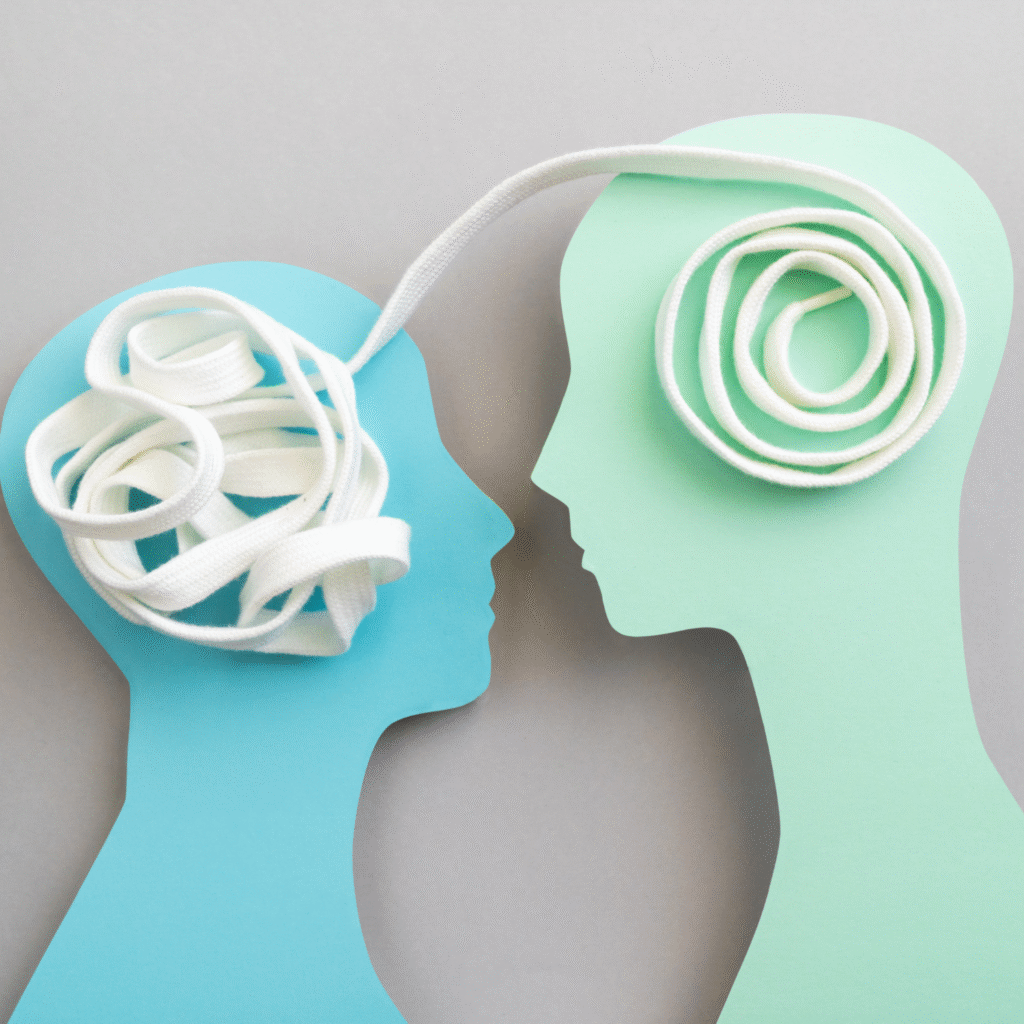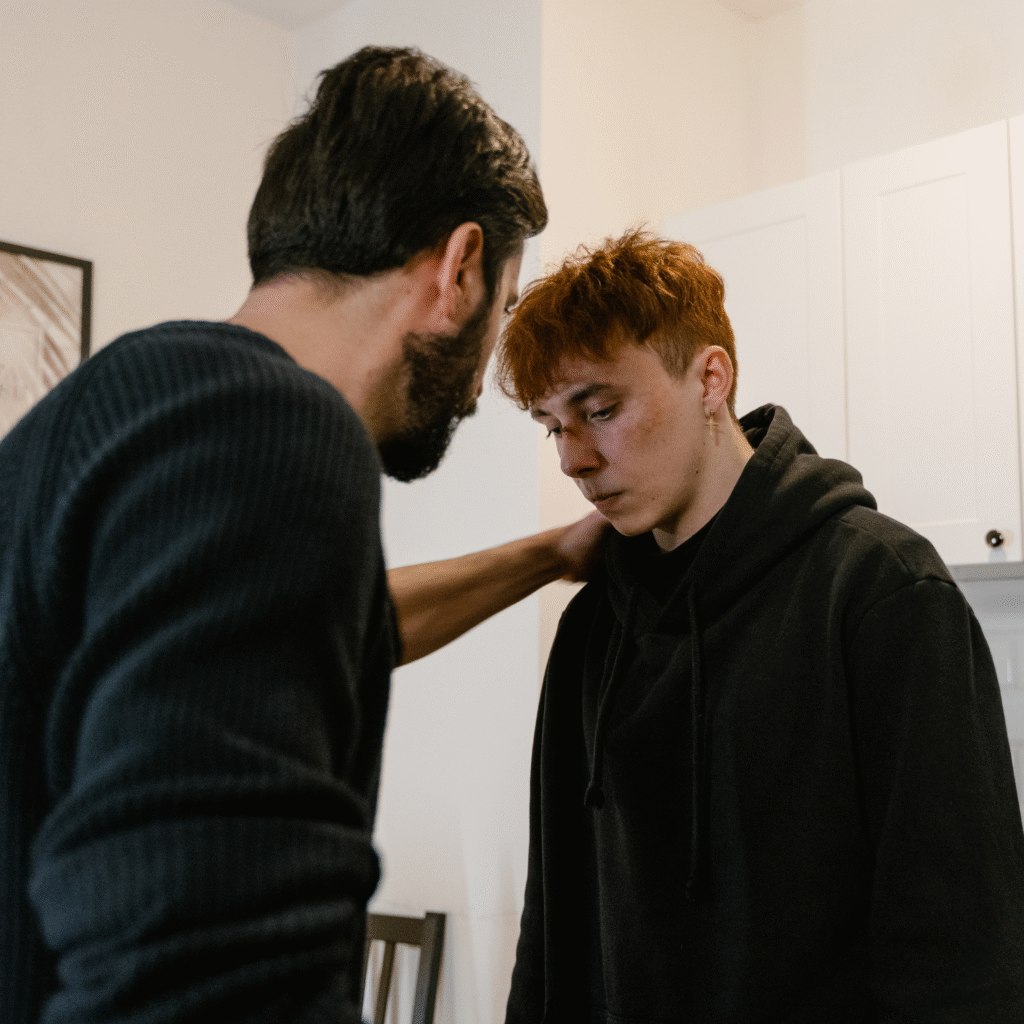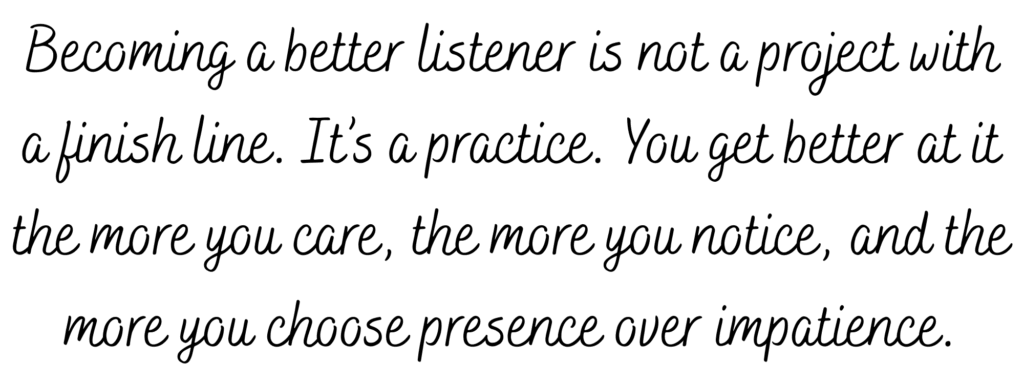We live in a world that rewards speaking up, getting noticed, putting our thoughts out there. It’s easy to forget that one of the most powerful skills we can develop is not about what we say, but how we listen.

Listening is more than hearing words. It’s the quiet, generous act of making space for someone else — or even for ourselves — to fully express what’s there. It’s a skill that deepens relationships, reduces misunderstandings, and builds trust. And yet, most of us, without realizing it, are often half-listening: preparing our next point, scanning our phones, waiting for the pause so we can jump in.
Becoming a better listener is not a trick. It’s a way of showing respect, curiosity, and care — for the people around us and for the life we’re building.
Why Listening Matters More Than We Think
Think about the last time someone truly listened to you. Not just nodded while mentally elsewhere, but really paid attention. You probably felt seen, valued, even lighter. The conversation likely went deeper, faster. That’s the power of listening: it doesn’t just gather information, it communicates, without a single extra word, “You matter.”

In friendships, it keeps bonds strong. At work, it turns colleagues into collaborators. At home, it transforms simple conversations into shared moments of connection. Listening well is a kind of invisible glue that holds human interactions together.
And it works both ways. When you listen with care, people tend to return the same energy. You set the tone. Suddenly conversations are less about winning a point and more about understanding each other.
The Noise We Carry Into Conversations
One reason listening is hard is that we bring so much of ourselves into every exchange — our assumptions, fears, eagerness, and the constant hum of busyness.

Sometimes we’re so ready to solve a problem that we skip hearing the full story. Other times we hear a single phrase, connect it to our own experience, and stop paying attention because our brain is busy crafting a response. And, in our digital age, distractions are always within reach. A buzzing phone can quietly pull part of our attention away without us even noticing.
Recognizing these patterns is the first step. You can’t fix what you don’t see. Once you’re aware of the noise you’re carrying, you can start setting it down — even briefly — to make room for real listening.
Listening Beyond Words
Good listening is not just about catching every sentence. People communicate in ways they don’t always name. Tone, pace, pauses, facial expressions, even what someone doesn’t say can carry meaning.

When someone says, “I’m fine,” but their shoulders are tense and their voice is flat, they might not be fine at all. When someone keeps circling the same point, maybe what they really need isn’t an answer, but reassurance that what they feel matters.
Tuning in to these subtle cues doesn’t require special training. It just requires slowing down, staying present, and caring enough to notice.
Listening to Understand, Not to Fix

Many of us listen like troubleshooters. We hear a problem and instantly offer a solution. But often, what people need first is not a fix — it’s a safe place to lay out what’s going on. Solutions feel better, land better, and often become obvious when someone feels fully heard.
A simple mental shift helps: instead of asking, “What should I say next?” try asking, “What is this person really trying to share with me?” That question naturally moves you toward empathy. It turns listening from a waiting game into an act of discovery.
Making Space for Silence
Silence in conversation can feel awkward. We rush to fill it. But quiet moments can be powerful. They give both people a chance to think, breathe, and go deeper. Sometimes the most meaningful parts of a conversation happen just after the pause, when someone finally shares what they were hesitant to say.
When you allow silence, you show you’re not in a hurry to move on — you’re here for the full story, not just the headlines.
Listening to Yourself, Too
Better listening isn’t just outward. It’s also about tuning in to your own thoughts and feelings with honesty. How often do we override what our bodies, moods, or instincts are trying to tell us because we’re too busy, too tired, or too distracted?

Listening to yourself helps you show up better for others. When you’re aware of your own emotional state, you’re less likely to project it onto the conversation. You can notice, “I’m stressed,” and decide not to take it out on the person talking to you. You can acknowledge, “I need a break,” and avoid building quiet resentment.
This inner listening is a kind of personal maintenance — it keeps your emotional engine running smoothly, so you can drive the journey of relationships with care.
Simple Practices to Strengthen Your Listening
You don’t need to overhaul your personality to become a better listener. Small, consistent choices make a big difference:
- Put the phone away. Physical distractions signal that something else might be more important than the person in front of you.
- Make eye contact. It’s a simple, powerful way of saying, “I’m with you.”
- Reflect back what you heard. Phrases like, “It sounds like you’re saying…” help confirm you understood and show that you’re engaged.
- Ask open questions. “How did that feel?” or “What happened next?” invite deeper sharing.
- Pause before responding. A breath or two gives you a chance to check your impulse to jump in and lets the other person finish their thought.

The Ripple Effect
Becoming a better listener doesn’t just improve individual conversations — it reshapes environments. Homes become calmer. Workplaces become more collaborative. Friendships deepen. Conflicts shrink. And, quietly, you begin to carry a kind of influence that doesn’t rely on volume or status but on presence.
People remember how you made them feel. And feeling heard is one of the rarest, most appreciated gifts you can give.
Closing Thoughts
In a noisy, distracted world, listening is a quiet form of leadership. It’s an act of humility and strength. It says, “For this moment, it’s not about me.” And that small decision, repeated across conversations, relationships, and years, builds trust, understanding, and connection — the very things that make life richer.

In the end, listening well doesn’t just change how others see you. It changes how you see the world — with more nuance, more compassion, and more space for what really matters.





